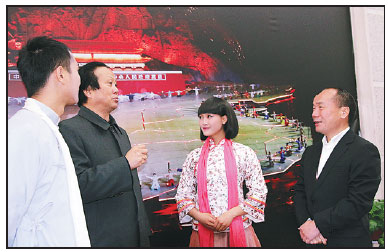 |
|
Xiong Xingbao (far right), general manager of the show’s main investor, with the main performers of the show. [Photo/China Daily] |
Starting with Mao leaving his village in Shaoshan as a young man, it concludes with the founding ceremony of the People's Republic of China. It is strung together with stories about his early revolutionary experiences during the War of Resistance Against Japanese Aggression (1937-45) and during the civil war that followed.
Xiong's company started to prepare for the show in 2012. They had several trial performances before it officially premiered, and continuously improved it later, he says.
For example, they increased the interaction between performers and the audience.
In a scene that's about the arrival of the Red Army in Yan'an after a treacherous strategic shift in the 1930s, the actors walk up to invite some of the spectators to join them on stage in their celebrations.
Besides the drama and music, the show provides the audience with an overwhelming experience due to the combined effect of the huge stage, large projections and stunning stunts.
In a scene featuring the Red Army fighting to cross an iron cable bridge, a large group of actors cross the stage in midair using real, thick iron cables stretched across.
The show also features special effects achieved using 4-D and holographic technologies. Water and fire are also used.
The performance area at 18,300 square meters is the largest outdoor stage in China. It can be divided into many pieces and can also be brought together to resemble the map of China.
Meanwhile, 2,000 of the 3,000 spectator seats can be moved when needed to give the audience a better viewing experience.
The project involves 330 crew members and 150 professional actors and actresses. It also has 50 local residents.
Yu Yiwei, 23, who plays Mao as a young man in the show, says the work has helped him gain a deeper understanding of both Mao and the country's history.
"For people of my generation, we don't know so much about this part of our history compared with generations before, and I wasn't very sure how to fully present the spirit of Chairman Mao through my performance," says Yu, who then started to read books and watch films to learn more about the leader.
"Now I have developed deep personal affection for Chairman Mao," says Yu. "He had big ambitions when he walked out of his village, and the stories as well as the lines can inspire young people like me."